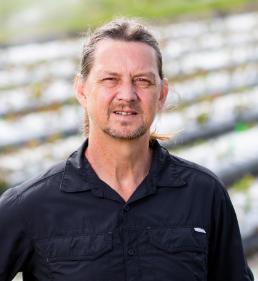Dr. Desaeger's Laboratory
Overview
The Gulf Coast Nematology laboratory is part of the GCREC small fruit and vegetable research and extension team, which includes experts across a wide range of disciplines.
The lab focuses on plant-parasitic nematodes (PPN). In short, nematodes are tiny roundworms that have a huge impact in our world. They have evolved to parasitize every living organism, including all major food crops with crop loss estimated at over 100 billion US$ every year and increasing.
In Florida plant-parasitic nematodes (PPN) are one of the main pests that farmers face. Our lab focuses on studying plant-parasitic nematodes in sub-tropical and tropical cropping systems and developing integrated nematode management (INM) solutions which will help to secure long-term sustainability of agriculture in Florida and similar regions across the world.
What we do
The lab works primarily on developing state-of-the-art nematode management strategies (Integrated Nematode Management, INM) for reducing nematode impacts using chemical, biological, cultural, and genetic methods; this includes evaluating nematicides, organic nematode management, cover crops, resistant cultivars, and monitoring.
Related areas of research, including soil health and quality, natural nematode suppression, and nematode-microbe interactions are an important component of this.
The crop focus of the lab is primarily:
- Vegetables
- Small fruits
- Ornamentals
- Alternative crops
- Cover crops
Research activities include:
- Laboratory – microscopy, nematode identification, molecular studies
- Greenhouse – testing of new products, cultivar screening, nematode culturing
- Field studies – testing products, cover crops, new crops and cultivars
Our lab also maintains close contact and provides nematology support to large and small growers, gardeners, and other stakeholders in Florida. We also maintain a 25-acre organic certified organic field at the GCREC where we focus on organic strawberry and vegetable production.
Impact
Plant parasitic nematodes are often called the unseen enemy because of their microscopic size, belowground nature, and the lack of easily recognizable symptoms. They are ubiquitous in Florida because of its warm climate and often sandy soil.
Soil fumigation is the main practice to manage nematodes in Florida and while effective it is expensive with many restrictions because of toxicity and environmental concerns.
The overall impact of our program is to reduce reliance on fumigation and develop effective and more integrated and sustainable programs combining different strategies:
- Sanitation practices – e.g. clean transplants
- Crop rotation – focus on cover crops
- Resistant and tolerant cultivars – working with breeding programs
- New nematicides – low-risk chemicals and biological products
- Monitoring and field mapping – field sampling and remote imaging
- Soil health management –to improve natural soil nematode suppressiveness

Contact
Dr. Johan Desaeger
Rm. 135
Gulf Coast Research and Education Center
14625 CR 672
Wimauma, FL 33598
813-419-6592
jad@ufl.edu
Current Lab Members
- Chenzhao Xie, Lab Manager
- Hung Bui, Biological Scientist
- Justin Carter, Field Manager
- Alexandros Dritsoulas, Post Doc
- David Moreira, PhD
- Laura Mayorga, PhD
-
MS Students' Work
Links coming soon!
-
PhD Students' Work
Links coming soon!
- Dr. Desaeger's Work

-copy-15.png)